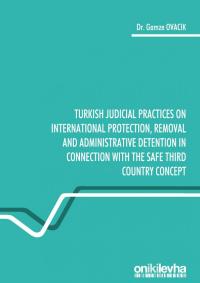Turkish Judicial Practices on International Protection, Removal and Administrative Detention in Connection with the Safe Third Country Concept
Gamze Ovacık
Whether Turkey should be deemed as a "safe third country" for asylum seekers in Europe is a legal conundrum that deserves heightened attention with the adoption of the EU-Turkey Statement of March 2016 and EU-Turkey Readmission Agreement. This book aspires to contribute to this discussion through an analysis of Turkish judicial practices on international protection, removal and administrative detention procedures, including their interaction with international and European framework and jurisprudence. One purpose of the book is to display the protection challenges that the safe third country concept creates through the example of Turkey. The position defended is that Turkish judicial practices or any other component of safe third country assessment such as administrative practices or normative framework should be evaluated from this perspective, by keeping in mind the inherent problems of the safe third country concept. In the assessment of Turkey's position as a safe third country for EU states, state of judiciary is a crucial factor. Judiciary acts as the ultimate safeguard for protection of rights and guiding administrative practices through interpretation of normative framework. Thus the second aim of this book is to analyze the problematic legal issues in Turkish judicial practices relevant to international protection, removal and administrative detention, based on an empirical study of decisions of Turkish courts. The empirical method in the qualitative analysis of Turkish jurisprudence is supported with a comparative analysis of the case law of the European Court of Human Rights, Court of Justice of the EU as well as the domestic jurisprudence of EU states.(ARKA KAPAKTAN)
TABLE OF CONTENTS
INTRODUCTION
CHAPTER I
SAFE THIRD COUNTRY CONCEPT IN INTERNATIONAL AND EUROPEAN LAW AND ITS IMPLEMENTATION WITH RESPECT TO TURKEY
I. Introduction
II. Turkey's position with respect to trans-border migratory dynamics
III. Areas of engagement with international law on asylum and migration by Turkey
IV. Evolution and scope of the safe third country concept
1. Emergence and purpose
2. Definition and legal basis
3. Conditions of application
4. Legal issues connected with the safe third country concept
5. Turkey's contributions to the evolution of the safe third country concept
V. Turkey's position as a safe third country with respect to EU member states
CHAPTER II
PROBLEMATIC ISSUES IN TURKISH JUDICIAL PRACTICES REGARDING INTERNATIONAL PROTECTION, REMOVAL AND ADMINISTRATIVE DETENTION PROCEDURES IN THE LIGHT OF EUROPEAN CASE LAW
I. Problematic issues in Turkish practice revealed through case law analysis for prospective research
II. Problematic issues in Turkish judicial practices regarding international protection procedures
1. Assessment of risk arising from non-state actors
2. Assessment of excuses with respect to indicators of implicit withdrawal of IP applications
3. Assessment of lawfulness of removal during review of withdrawal or rejection of IP applications
III. Problematic issues in Turkish judicial practices regarding removal procedures
1. Implementation of removal grounds related to threat to public security and public order
2. Judicial review in connection with non-specification of country of removal by administration
3. Instances of inconsistency between interim measure and merit decisions of the CC
IV. Problematic Issues in Turkish Judicial Practices regarding Administrative Detention Procedures
1. Jurisdiction of criminal judges with respect to lawfulness of administrative detention
2. Implementation of risk of absconding as a ground for administrative detention for removal purposes
3. Judicial review of de facto administrative detention
4. Compensation for unlawful detention and effective remedy regarding detention conditions
CONCLUSION
REFERENCES


